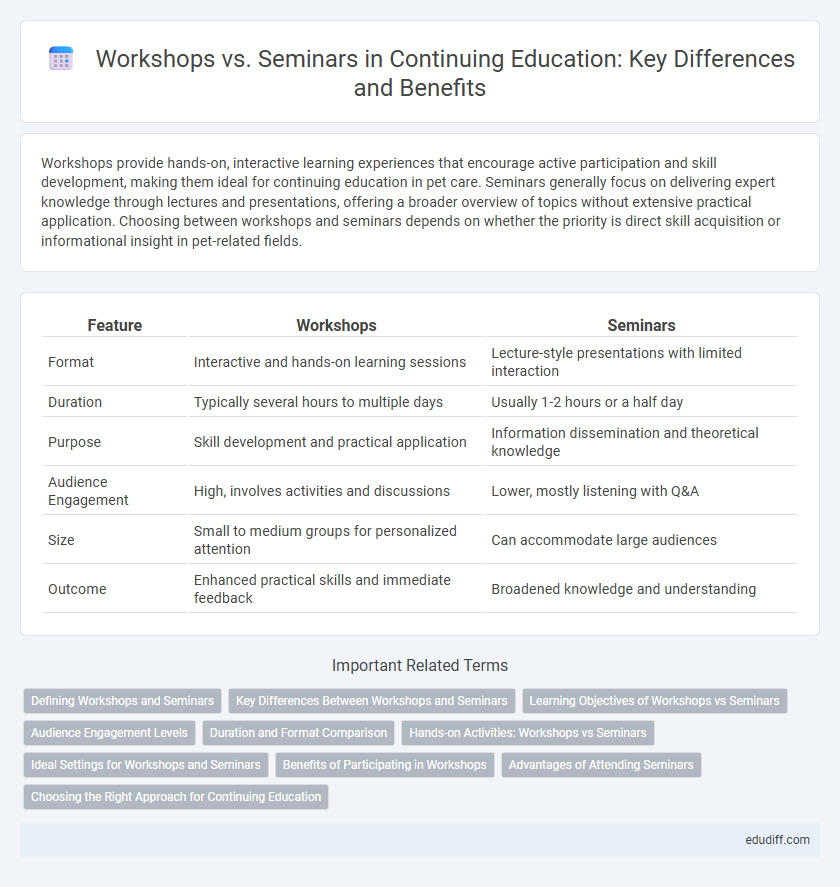Workshops provide hands-on, interactive learning experiences that encourage active participation and skill development, making them ideal for continuing education in pet care. Seminars generally focus on delivering expert knowledge through lectures and presentations, offering a broader overview of topics without extensive practical application. Choosing between workshops and seminars depends on whether the priority is direct skill acquisition or informational insight in pet-related fields.
Table of Comparison
| Feature | Workshops | Seminars |
|---|---|---|
| Format | Interactive and hands-on learning sessions | Lecture-style presentations with limited interaction |
| Duration | Typically several hours to multiple days | Usually 1-2 hours or a half day |
| Purpose | Skill development and practical application | Information dissemination and theoretical knowledge |
| Audience Engagement | High, involves activities and discussions | Lower, mostly listening with Q&A |
| Size | Small to medium groups for personalized attention | Can accommodate large audiences |
| Outcome | Enhanced practical skills and immediate feedback | Broadened knowledge and understanding |
Defining Workshops and Seminars
Workshops are interactive sessions designed to develop specific skills through hands-on activities and direct participant involvement. Seminars focus on delivering detailed information or research findings, often featuring expert presentations and audience discussions. Both formats aim to educate, but workshops emphasize practical application while seminars prioritize knowledge dissemination.
Key Differences Between Workshops and Seminars
Workshops emphasize interactive, hands-on learning where participants actively engage in practical exercises, whereas seminars primarily focus on delivering information through lectures or presentations. Workshops typically involve smaller groups to foster collaboration and skill development, while seminars can accommodate larger audiences aimed at knowledge dissemination. Time duration also varies, with workshops often spanning several hours to multiple days, contrasting with shorter seminars that center on specific topics.
Learning Objectives of Workshops vs Seminars
Workshops emphasize hands-on learning objectives designed to develop practical skills and active participation through interactive exercises. Seminars focus on knowledge dissemination and conceptual understanding, aiming to provide in-depth information through expert presentations and discussions. The learning objectives of workshops prioritize skill acquisition and application, while seminars target theoretical comprehension and intellectual engagement.
Audience Engagement Levels
Workshops foster active audience engagement through hands-on activities, group discussions, and practical exercises that enhance learning retention. Seminars typically involve passive listening, with limited interaction, focusing more on information delivery from experts to attendees. Higher engagement levels in workshops lead to improved skill development and greater participant involvement compared to the traditional seminar format.
Duration and Format Comparison
Workshops typically span several hours to multiple days, offering hands-on, interactive sessions that engage participants directly in skill development. Seminars are usually shorter, often lasting one to two hours, and focus on delivering information through lectures or presentations. The format of workshops emphasizes active participation and practical exercises, while seminars prioritize knowledge dissemination and audience listening.
Hands-on Activities: Workshops vs Seminars
Workshops emphasize hands-on activities that foster practical skill development through interactive exercises and real-time feedback. Seminars primarily offer passive learning experiences focused on lectures and presentations, limiting participant engagement. Hands-on workshops enhance retention and application of knowledge by immersing attendees in active problem-solving scenarios.
Ideal Settings for Workshops and Seminars
Workshops thrive in interactive settings that encourage hands-on learning, collaboration, and skill development, making them ideal for small groups or teams seeking practical application. Seminars suit larger audiences where information dissemination, expert presentations, and idea exchange are the primary goals, often in academic or professional conference environments. Choosing between workshops and seminars depends on the desired engagement level, participant interaction, and the depth of content delivery.
Benefits of Participating in Workshops
Participating in workshops offers hands-on experience and practical skill development tailored to specific topics, fostering deeper understanding compared to passive learning formats like seminars. Workshops encourage active collaboration and networking with peers, enhancing problem-solving abilities and promoting real-time feedback. This interactive environment accelerates mastery of concepts, making workshops highly effective for professional growth and knowledge retention.
Advantages of Attending Seminars
Seminars offer unparalleled opportunities to learn from industry experts and gain cutting-edge insights relevant to current trends. Attending seminars enhances networking potential by connecting participants with professionals, thought leaders, and peers in their specific field. These events also provide a structured environment for focused learning, fostering deeper understanding through presentations and interactive Q&A sessions.
Choosing the Right Approach for Continuing Education
Selecting the right continuing education format depends on individual learning goals and preferred interaction levels. Workshops provide hands-on experience and active participation, ideal for skill development and practical application. Seminars offer expert insights and theoretical knowledge, suitable for expanding understanding and networking within a professional field.
Workshops vs Seminars Infographic

 edudiff.com
edudiff.com